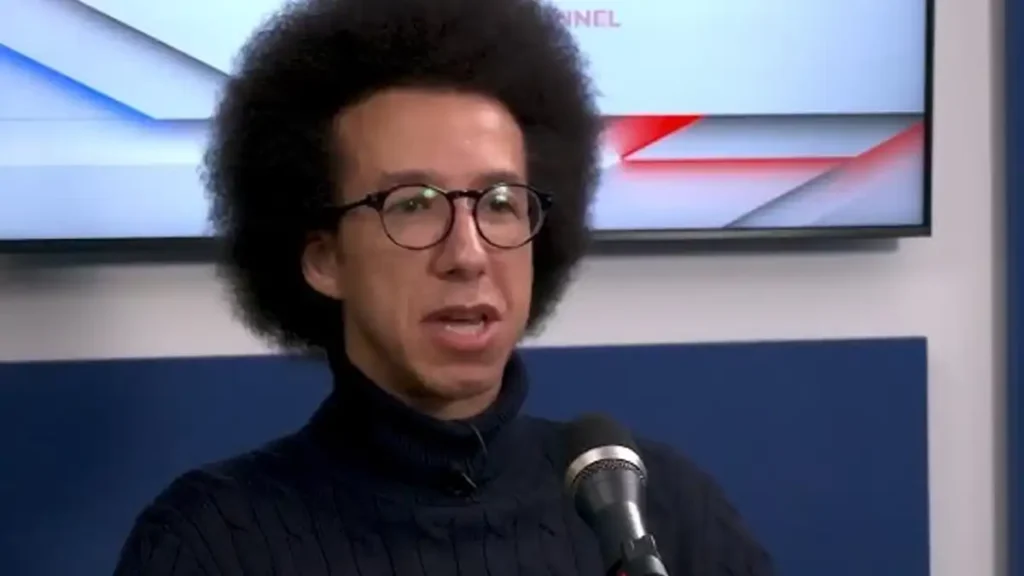Calvin Robinson Gender: What Happened Calvin Robinson
Delving into the intricate web of Calvin Robinson’s personal life invites us into the complex tapestry of a British cleric, conservative political commentator, author, and broadcaster. Before weaving his way through the corridors of political discourse, Robinson served as a science professor, leaving an indelible mark on diverse political and social spheres.

Calvin Robinson Gender
His association with right-wing political organizations and campaigns is a cornerstone of his public identity. Robinson stands in opposition to key race ideas and the Black Lives Matter movement. As we tread deeper into the contours of his life, a subtle murmur of speculation arises. Netizens, fueled by curiosity, have suggested the possibility of him being gay, capturing the collective attention of those who follow his journey.
Navigating this landscape requires a nuanced understanding of Robinson’s public stance on various issues. His articulate and powerful speeches have reverberated through social media, earning him significant attention. Notably, he has delved into the contentious realm of same-se* marriage and unions within the Christian context, professing acceptance and blessing, a stance that echoes his progressive leanings in this particular area.
Despite the speculations circulating in the digital domain, there exists no concrete data or credible reports confirming Robinson’s sexual orientation. His private life, including matters of the heart, remains veiled in discretion. This deliberate choice to shield his personal life from the public eye adds an enigmatic layer to Robinson’s persona.
Notably, Robinson’s views on marriage are rooted in his interpretation of biblical principles. He contends that both heterosexual and gay relations of marriage are condemned as sins within the pages of the Bible, with particular emphasis on the latter being labeled as heinous. This stance reflects a deeply ingrained commitment to historic Christian doctrine, a theme recurrent in his speeches.
To unearth the threads of Robinson’s personal life, we traverse the realms of education and politics, domains where he has left an indelible mark. Remarkably, there’s an absence of a spouse or a family in his immediate narrative. The intricacies of his marital status remain shrouded, with changes noted since the last public disclosure.
Delving further into the fabric of his existence, details about Robinson’s parents and family elude public scrutiny. In a realm where privacy is a cherished commodity, Robinson has successfully guarded these aspects of his life from the prying eyes of curiosity. The only glimpse into his heritage is through his own description, where he identifies as a person of mixed race—half white and half black.
In our quest for understanding, it is crucial to navigate this narrative with an ethical compass that respects the boundaries of an individual’s privacy and mental well-being. Robinson, in his multifaceted role, emerges not just as a public figure but as a person navigating the complexities of identity, belief, and personal relationships.
In this unfolding saga, as we explore the nuances of Calvin Robinson’s life, we must tread with caution and empathy, recognizing the importance of preserving the integrity of a person’s private space. The journey into the depths of his existence is marked by complexities that invite reflection on the delicate balance between public scrutiny and the right to a personal sanctuary.
As we continue to navigate the intricacies of Calvin Robinson’s public identity, it becomes evident that his journey extends beyond the realms of politics and commentary. His tenure as a science professor, a role preceding his foray into political discourse, adds layers to the narrative of a man whose intellectual pursuits have shaped both his professional and personal landscapes. The transformation from the academic arena to the political stage showcases the breadth of his interests and the evolution of his perspectives.
While Robinson’s vocal opposition to certain social movements may place him in the spotlight, it is essential to recognize the multifaceted nature of his beliefs. His progressive stance on same-se* marriage and unions within Christianity illustrates a willingness to embrace societal shifts and challenges traditional norms. This duality in his positions mirrors the complexity of societal conversations, where individuals grapple with navigating change while holding onto foundational values.
In dissecting Robinson’s speeches, his emphasis on addressing challenges posed by church authorities supporting same-se* unions reveals a commitment to engaging with contentious issues head-on. His discourse extends beyond mere critique, delving into the preservation of historic Christian doctrine. This intellectual rigor underscores his dedication to fostering thoughtful dialogue, even in the face of opposition.
The absence of concrete information regarding Robinson’s marital status raises questions about the intersection of personal life and public perception. In a landscape dominated by social media and relentless curiosity, the decision to shield certain aspects of one’s life from public scrutiny is a deliberate choice. It prompts a broader reflection on the balance individuals must strike between transparency and safeguarding their private realms.
The mention of Robinson’s heritage as mixed race—half white and half black—adds a dimension of cultural richness to his identity. In an era marked by conversations around diversity and inclusivity, his self-identification offers a glimpse into the complexities of navigating dual cultural heritage. It serves as a reminder that individuals, even those in the public eye, embody a mosaic of experiences that shape their worldview.
As we navigate the labyrinth of Calvin Robinson’s life, it is crucial to acknowledge the broader societal implications of discussions around public figures. The scrutiny they face often transcends individual narratives, becoming emblematic of larger societal debates. Robinson’s journey invites us to engage with these conversations with empathy, recognizing that the stories we unravel are not just about one man but are reflections of the collective complexities that define our contemporary landscape.
In contemplating Calvin Robinson’s intricate narrative, it is essential to consider the broader societal context that shapes and, in turn, is shaped by his experiences. The discourse surrounding his personal life and beliefs mirrors the ongoing societal dialogue on issues of identity, diversity, and the constant negotiation between tradition and change. Robinson’s journey serves as a microcosm of the evolving narratives within our global community, urging us to delve deeper into the complexities that define our shared human experience. As we peer into the details of his life, we are not merely observers of an individual’s story but participants in a collective narrative that prompts reflection on the intersections of public and private, tradition and progress, and the dynamic interplay between personal convictions and societal expectations.







